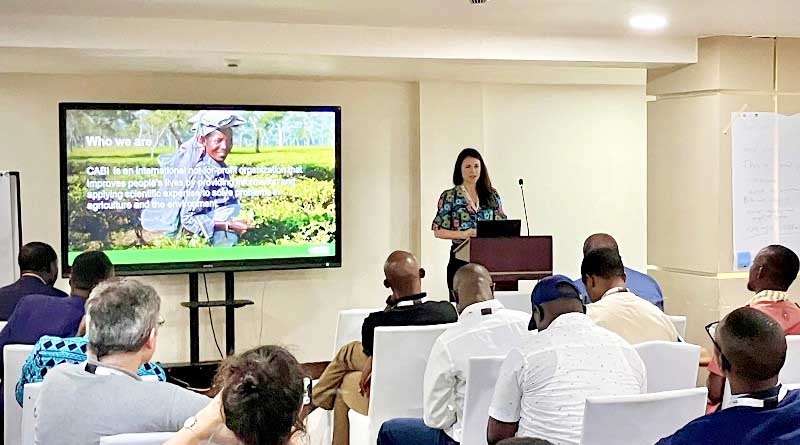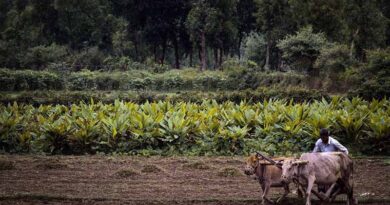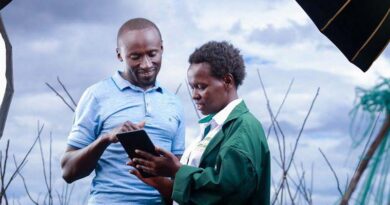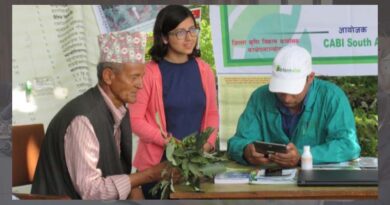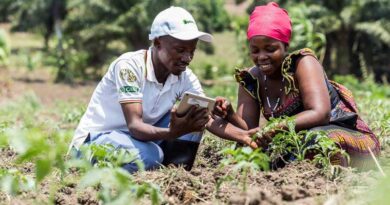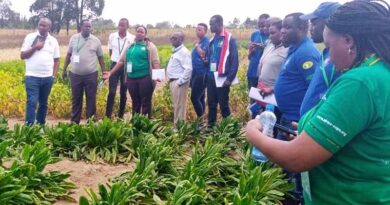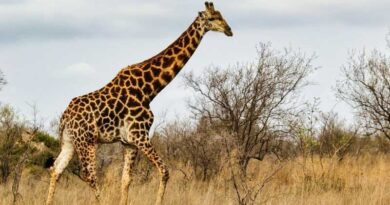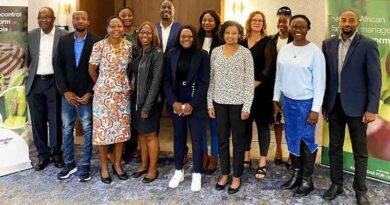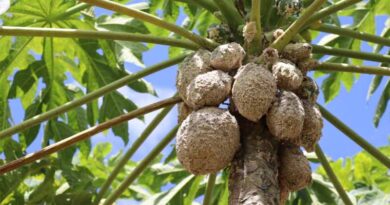CABI shares its expertise at ICT for Development (ICT4D) Conference
28 March 2024, Ghana: CABI has shared its expertise in digital development for improved livelihoods and greater food security at the 12th Information Communication Technology for Development (ICT4D) Conference held in Accra, Ghana.
Katherine Cameron, Head of Digital Advisory Tools, and Henry Mibei, Manager, Digital Development, Africa, gave examples of CABI’s work in digital development at the event including the PlantwisePlus digital decision support tools and use of drone technology for pest surveillance.
The 12th ICT4D Conference was attended by 700 technical advisors and senior executives from public, private, and civil society organizations from across the humanitarian and international development community.
It was aimed at exploring how digital data innovations are making a measurable difference in millions of peoples’ lives and increases the impact of humanitarian relief, development, and conservation projects.
Digital farm advisory plays a key role in information transfer to smallholder farmers
In her presentation ‘Digital delivery of agricultural advice to smallholder farmers in Ghana and beyond,’ Ms Cameron said public and private-sector extension services play a key role in technology and information transfer to lift people out of poverty.
However, the vast majority of smallholder farmers have poor access to public extension agents, through chronic understaffing, lack of institutional capacity, limited funds, and week linkages. There are high hopes that digital farm advisory can help to overcome these limitations by facilitating wider reach.
She said the PlantwisePlus Digital Toolkit contains nine digital advisory tools and e-learning resources to support the decision making of agricultural advisors on one easy-to-use platform. Many more apps exist to facilitate decision making in crop production and have been collated by CABI in the Crop App Index, which currently includes over 1,100 agricultural digital tools.
“Rapid increases in digitalisation and smartphone access over the last 5-10 years has led to an enormous number of apps being available for almost everything.
“Through a process of assessment and evaluation of the apps included in the Crop App Index we hope to identify complementary apps and partnerships to build on CABI’s existing digital toolkit, helping farmers and advisors to navigate the overwhelming abundance of digital tools,” she said.
Tools that she highlighted included the CABI BioProtection Portal which is a free tool to enhance the awareness and uptake of biocontrol and biopesticide products.
It is beneficial for growers and advisors who need current and reliable information, on-demand, regarding the availability and correct use of effective, lower toxicity products that are registered locally and meet market requirements.
Ms Cameron further highlighted how PRISE – which combines earth observation derived weather data with pest risk models – gives early warning pest alerts to farm advisors in Kenya, Zambia, Malawi, and Ghana.
She concluded by offering recommendations which included coordinating with other digital tool providers by creating partnerships rather than building lots of new tools and using multichannel dissemination of advisory information to maximise the reach to smallholder farmers.
This includes reducing the gender divide for access to digital tools by including women in tool design, capacity strengthening on use of digital tools and using behaviour change communication campaigns to change attitudes towards women’s access to extension and advisory tools.
Ms Cameron said, “Farmers can now access a wealth of scientific information gathered by experts worldwide, peer-reviewed and shared on easy-to-use, communication platforms, which complement existing agricultural extension services.
“However, challenges remain to ensure long-term uptake and use of tools, particularly by women, and sustainable business models are needed to maintain free access by smallholder farmers. Multichannel delivery of advice is vital to reach the many smallholder farmers who are currently still underserved.”
Drone technology in the fight against crop devastating desert locusts
Meanwhile, Mr Mibei spoke about how drone technology has the potential to improve precision agriculture through early identification of pests and diseases and the application of the control agents more precisely. They can also help estimate crop yields – facilitating informed decisions on pest prevention, he said.
In his presentation ‘Drone technology for climate resilient food systems in Africa,’ Mr Mibei said drones can be used to predict the spatial and temporal pattern/distribution of pests, diseases in a field as well as help with the precise application of pesticides, biopesticides, natural enemies, fertilizers, seeding and irrigation.
Mr Mibei highlighted how CABI in partnership with Astral-Aerial used the drone technology to control the desert locust in early 2020 when thousands of Kenyan farmers and rural communities suffered a severe disaster following a desert locust invasion which destroyed their crops.
Mr Mibei referenced the pilot study that was led by Violet Ochieng, CABI’s Research Officer – Invasive Species Management, Drone Technology that evaluated the benefits and efficiency of using drone technology as a complementary spraying method to manage locusts, including its effect on other beneficial insects and the environment.
The research study found out that spraying desert locusts using a drone at any height below 10 metres may lead to over-deposition of the biopesticide, while heights above 10 metres may lead to under-application, which may limit exposure of the locusts to Metarhizium spores or pesticide molecules.
The research study also highlighted that while current methods of control rely on conventional chemical insecticides during invasion, some environmentally friendly biopesticides based on Metarhizium acridum and insect growth regulators can also be deployed in preventative control operations.
Drones to map the distribution and spread of prickly pear cactus
Mr Mibei highlighted how CABI is currently using drones to map the distribution and spread of prickly pear cactus Opuntia engelmannii in Laikipia county, 253 kilometres north of Nairobi, Kenya.
Here CABI is also testing the use of a biocontrol solution – the agent Dactylopius opuntiae (prickly pear cochineal), which is a sap-sucking insect that has already proved effective against similar non-native cactus species – Opuntia stricta (erect prickly pear) – at the Kruger National Park in South Africa.
Mr Mibei in his conclusion highlighted, however, some challenges to drone adoption in precision agriculture in Africa. These include prohibitive start-up costs such as those associated with software and training, adapting to changes in the drone regulatory environment and challenges with processing the large amounts of data collected by drones.
“Farming operations largely take place over wide stretches of land with interactions with people and buildings. When operating drones in such areas, government regulations around the use of drones must be strictly adhered to,” he said.
“Research activities require much higher resolution data, and therefore, more data can be collected using the drone technology. The challenge comes with data processing which calls for a need to partner with data processing companies to avoid bad data or no data at all,” he said.
He added that Artificial Intelligence (AI) a uniquely powerful and transformative technology can also be combined with drones. As the drones has the capability to fly autonomously and tirelessly over farms – monitoring and collecting farm data at regular intervals, AI have the potential to process and scrutinize the collected data, providing valuable insights and trends.
CABI digital advisory tools and e-learning resources
Kevin Muraguri, the Agri-Digital Tools Communications Coordinator for Africa and Enid Araba Samoah, also greeted visitors to a stand at the two-day event where they highlighted CABI digital advisory tools and e-learning resources that help farmers increase their yields and livelihoods.
The CABI digital advisory tools are leveraging significant opportunities for accessing data and information that could empower agricultural service providers in giving right information to farmers globally.
ICT4D was founded in 2010 by Catholic Relief Services. The Conference has grown each year to become an internationally recognized high-profile platform for NGOs, community-based organizations, private sector companies, governmental and multi-lateral agencies, investors, donors, academic and research institutions to exchange their experiences in using digital technologies and learn from each other.
Its goal is to advance global knowledge exchange and build capacity on ICT4D and digital development to drive more impactful use of technology for good.
ICT4D aims to do this by facilitating knowledge exchange on best practices and innovations, creating inclusive spaces for cross-sectoral learning and capacity-building, and fostering partnerships in ICT4D among local and international actors.
(For Latest Agriculture News & Updates, follow Krishak Jagat on Google News)

